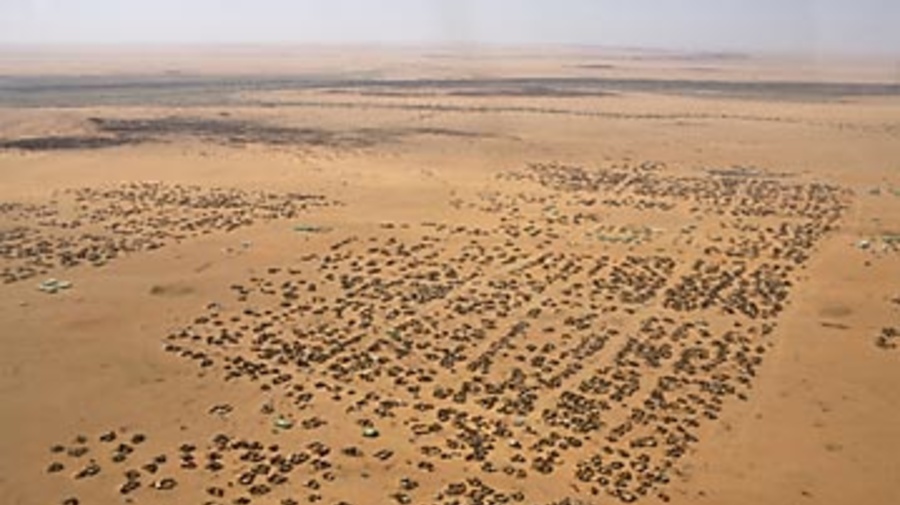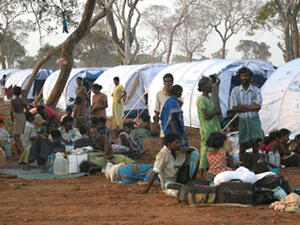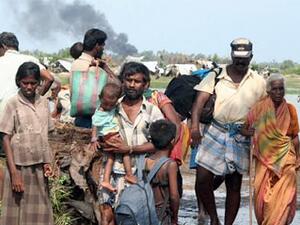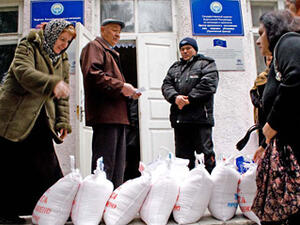UNHCR warns against rebel infiltration of refugee camps in eastern Chad
UNHCR warns against rebel infiltration of refugee camps in eastern Chad

Oure Cassoni refugee camp in the deserts of eastern Chad where earlier this week, in the latest of a string of such incidents, Sudanese rebels entered the camp.
BAHAI, eastern Chad, May 26 (UNHCR) - The ongoing infiltration of refugee camps in eastern Chad by Sudanese rebels is a threat to the civilian and humanitarian character of the camps and could endanger refugees and the humanitarian operation to help them, UNHCR said Friday.
On Tuesday, at least three pick-up trucks, with men identified as members of one of the Sudanese rebel groups, entered the northern Oure Cassoni Camp which lies seven kilometres from the Sudanese border and some 20 kilometres north of the town of Bahai.
The camp, home to some 27,000 Sudanese refugees from Darfur, has been suspected of being used as a rest and recuperation base for Sudanese rebels. But, this is the first time the rebels have been seen so openly in broad daylight, driving and walking around the camp.
"Humanitarians simply cannot continue to work in these insecure and volatile conditions if the camp becomes a base for various military groups. Their presence will definitely have a very negative impact on the delivery of assistance to the refugees if it continues," said UNHCR's representative in Chad, Ana Liria-Franch. "The continued presence of rebels in the camps would make our work there increasingly difficult," she added.
Last week, UNHCR condemned the infiltration of rebel military groups in other refugee camps in eastern Chad including Treguine, Breidjing and Goz Amir.
UNHCR spokeswoman Jennifer Pagonis at a press briefing in Geneva on Friday said the UN refugee agency was deeply disturbed by these reports, fearing it meant further recruitment of refugees for military activities.
"We strongly condemn the infiltration of refugee camps by any military presence. This situation is totally unacceptable. It violates the civilian and humanitarian character of the refugee camps and risks making refugees and humanitarian workers a target," she said.
Pagonis warned that if the humanitarian character of the camps was not protected, it could jeopardize the humanitarian operation.
"We want to stress to the Chadian authorities, rebel groups and refugees that military infiltration of the camps cannot continue. If not stopped, it could result in the suspension of humanitarian activities," she said.
When challenged, the men in the pick-ups in Oure Cassoni camp claimed they were visiting family members, needed medical care and were getting cigarettes.
"We immediately informed the local authorities about the infiltration. On Wednesday and Thursday we met with our implementing partners, local authorities, camp gendarmes and refugee leaders. The refugees were clearly reminded of their rights, duties and obligation not to engage in political nor military activity in Chad and most specifically not in the camps."
Refugees are being reminded through an information campaign about the risks they run if the camps become militarised.
"It is true that men in military clothes entered the camp on Tuesday. They came to us for medicine. I know it's illegal to enter the camp like that. You have to come in civilian clothes," said Abdel, a refugee leader.
Another refugee leader, Awad, said some refugees who rejected the Abuja peace agreement signed earlier this month, were attracted to rebel activities.
Pagonis stressed that the responsibility for security in and around the refugee camps rests with the Chadian government. "We are working with them on increasing their resources," she said.
Oure Cassoni Camp, which lies in a hostile desert-like landscape frequently exposed to sandstorms and extreme heat during the day, was opened in July 2004.
There are over 200,000 refugees from Darfur in twelve camps in eastern Chad.
By Hélène Caux in Bahai, eastern Chad









